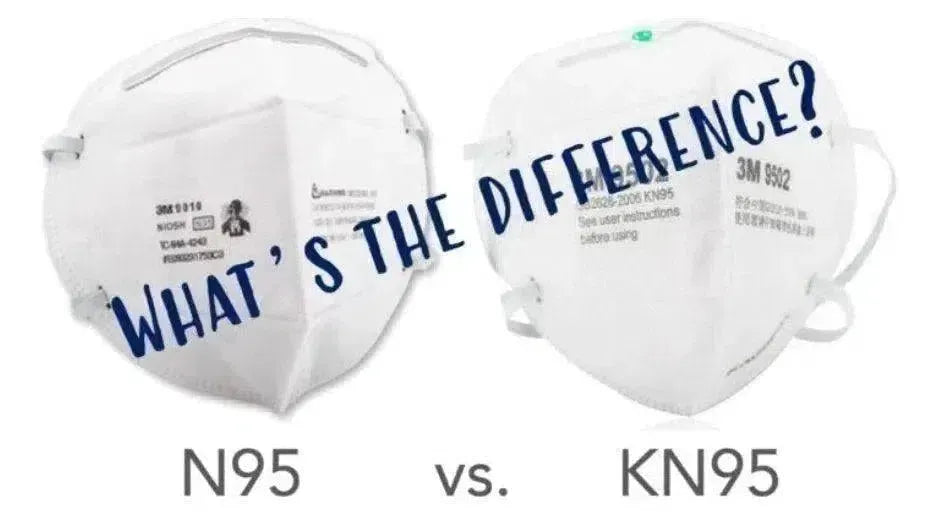Everything You Wanted to Know (and More) About KN95 Masks

Prior to the COVID-19 pandemic, very few people had ever interacted with things like face coverings and surgical and medical-grade masks. However, in 2020, practically all of us became very well acquainted with the function and importance of high-quality masks.
Even as the lockdowns across the country start to lift and more people get vaccinated, masks will still be widely used and needed. It's important that people stay knowledgeable about the kinds of equipment that are available to safely stop the spread of the virus and there many different kinds of masks that can help people do that.
Some of the best masks out there are the N95 and KN95 masks. You may be wondering what the difference is between these two kinds of masks and how effective they are. Luckily for you, we've got the answers you need.
So keep on reading and we'll walk you through everything you wanted to know about KN95 masks.
What Is A KN95 Mask?
To put it simply, a KN95 mask is the Chinese equivalent of the N95 masks that are made by American manufacturers. These masks are regulated by the Chinese government and are approved by the US Food and Drug Administration (FDA).
Due to a shortage of N95 masks, the FDA has authorized the emergency use of KN95 masks. Both masks can filter up to 95 percent of the particles in the air and they are designed to create an airtight seal around the user's face.
How Does The KN95 Work?
The KN95 mask works just like the American equivalent. Both masks are able to capture particles that measure 0.3 microns in diameter. While the coronavirus particles are technically smaller in size, the KN95 mask is still an effective way to prevent COVID particles from entering the mask user's body.
What Makes A KN95 Mask Effective
Thanks to their design and their construction, the KN95 masks are very effective. They are made up of two outer layers of non-woven fabric that filters particles measuring at least 0.5 microns in diameter.
In between the layers, the masks is outfitted with an activated carbon filter layer. This is used to absorb chemical pollution. It also comes with a thick cotton layer that is able to filter out particles measuring at least 0.3 microns in diameter.
These masks are tested and designed fit to achieve less than eight percent leakage.
The masks also come with adjustable metal nose strip brackets for comfort on the exterior of the mask.
Other Uses For KN95 Masks
While you might not think of it, KN95 masks can be used for many useful situations other than to prevent the coronavirus. When it finally comes time to go back to work, there are certain occupations that will benefit from KN95 masks more than others. These jobs include:
- metalworking
- shipbuilding
- steel and iron foundries
- sawmills
- pharmaceuticals
- engineering
- ceramics and pottery production
- quarrying
- construction
In most cases, the KN95 masks are able to protect a person from being exposed to dangerous chemicals in the work setting. These masks can ensure a safe work environment and prevent health issues from occurring.
Pros and Cons KN95 Masks
The benefits of wearing a medical-grade mask like the KN95 during the coronavirus pandemic are fairly self-evident. This is a potentially life-saving tool that can significantly reduce the spread of the virus.
Other than social distancing, this is one of the best tools for protecting yourself and those around you. There are many other useful applications for these masks in a work environment that require exposure to toxic particles or chemicals. These masks filter out a significant amount of particles in the air.
These masks use non-woven fabric on the interior that is easy on the skin. This helps to decrease allergic reactions for people who have sensitive skin.
One of the few cons of these masks is that it's recommended that they should only be worn two or three times. They're not as reusable as some other masks out there.
Differences Between N95 and KN95 Masks
The biggest visible difference between the two masks has to do with the kind of straps that they use to stay on your face. With NIOSH standards, the N95 masks require behind-the-head straps. KN95 masks, on the other hand, use earloop straps.
While the KN95 masks need to pass fit tests, N95 masks don't. The better a mask fits, the more effective it will be at preventing the spread of particles.
There are also some minor differences in terms of testing standards. However, both masks pass through the same standards to properly filter bacteria, which is comforting good to know.
Lastly, N95 masks come with slightly stronger standards for breathability. This means that the masks have slightly different exhale and inhale pressure standards. The average person will likely not notice the difference because these standards are so close.
However, people with chronic sinusitis, asthma, or other breathing issues, might benefit slightly from buying N95 NIOSH respiratory masks.
The Importance of Knowing About KN95 Masks
Hopefully, after reading the above article, you now have a better understanding of what KN95 masks are and how they work. As we can see, KN95 masks can be extremely effective at preventing the spread of the COVID-19 virus. Plus, they can assist in protecting people in various other situations as well.
Are you interested in purchasing KN95 masks for yourself or your loved ones? If so, then contact us today and see how we can help you!






